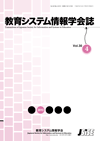Volume 30, Issue 1
Displaying 1-18 of 18 articles from this issue
- |<
- <
- 1
- >
- >|
Preface
-
2013 Volume 30 Issue 1 Pages 1-3
Published: January 01, 2013
Released on J-STAGE: April 27, 2018
Download PDF (256K)
Service Award
-
2013 Volume 30 Issue 1 Pages 4
Published: January 01, 2013
Released on J-STAGE: April 27, 2018
Download PDF (298K)
The Japanese Society for Information and Systems in Education 2012 Article Award
-
2013 Volume 30 Issue 1 Pages 5
Published: January 01, 2013
Released on J-STAGE: April 27, 2018
Download PDF (107K)
Special Issue: Towards Advanced Learning Support by Evolution of Information and Communication Technology
Editor's Message for the Special Issue
-
2013 Volume 30 Issue 1 Pages 6-7
Published: January 01, 2013
Released on J-STAGE: April 27, 2018
Download PDF (222K)
Review
-
2013 Volume 30 Issue 1 Pages 8-19
Published: January 01, 2013
Released on J-STAGE: April 27, 2018
Download PDF (1347K)
Original Papers
-
2013 Volume 30 Issue 1 Pages 20-31
Published: January 01, 2013
Released on J-STAGE: April 27, 2018
Download PDF (1190K) -
2013 Volume 30 Issue 1 Pages 32-41
Published: January 01, 2013
Released on J-STAGE: April 27, 2018
Download PDF (1089K) -
2013 Volume 30 Issue 1 Pages 42-53
Published: January 01, 2013
Released on J-STAGE: April 27, 2018
Download PDF (863K) -
2013 Volume 30 Issue 1 Pages 54-64
Published: January 01, 2013
Released on J-STAGE: April 27, 2018
Download PDF (1201K) -
2013 Volume 30 Issue 1 Pages 65-76
Published: January 01, 2013
Released on J-STAGE: April 27, 2018
Download PDF (758K)
Practical Paper
-
2013 Volume 30 Issue 1 Pages 77-91
Published: January 01, 2013
Released on J-STAGE: April 27, 2018
Download PDF (1170K)
Short Notes
-
2013 Volume 30 Issue 1 Pages 92-97
Published: January 01, 2013
Released on J-STAGE: April 27, 2018
Download PDF (808K) -
2013 Volume 30 Issue 1 Pages 98-103
Published: January 01, 2013
Released on J-STAGE: April 27, 2018
Download PDF (470K) -
2013 Volume 30 Issue 1 Pages 104-109
Published: January 01, 2013
Released on J-STAGE: April 27, 2018
Download PDF (457K) -
2013 Volume 30 Issue 1 Pages 110-115
Published: January 01, 2013
Released on J-STAGE: April 27, 2018
Download PDF (1368K) -
2013 Volume 30 Issue 1 Pages 116-121
Published: January 01, 2013
Released on J-STAGE: April 27, 2018
Download PDF (499K) -
2013 Volume 30 Issue 1 Pages 122-127
Published: January 01, 2013
Released on J-STAGE: April 27, 2018
Download PDF (690K)
Community Plaza
-
2013 Volume 30 Issue 1 Pages 128-134
Published: January 01, 2013
Released on J-STAGE: April 27, 2018
Download PDF (1246K)
- |<
- <
- 1
- >
- >|
